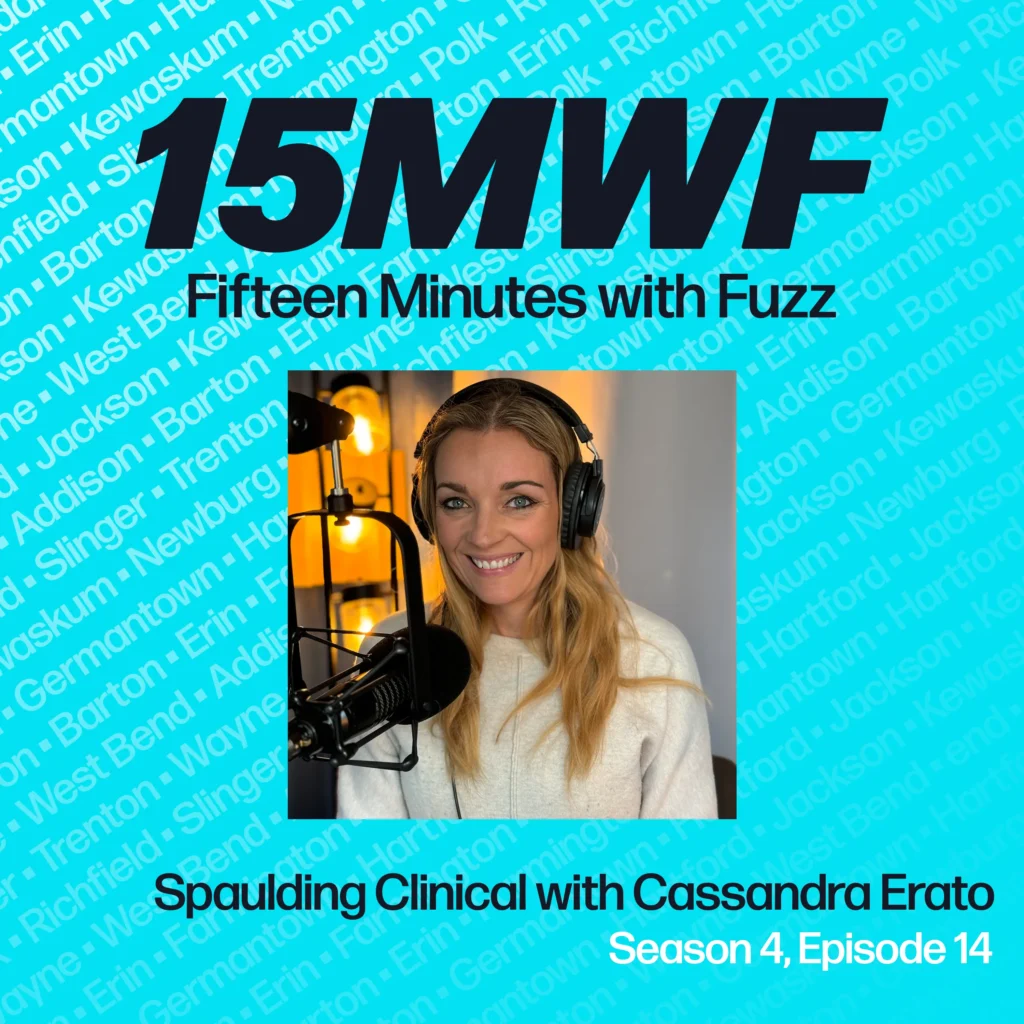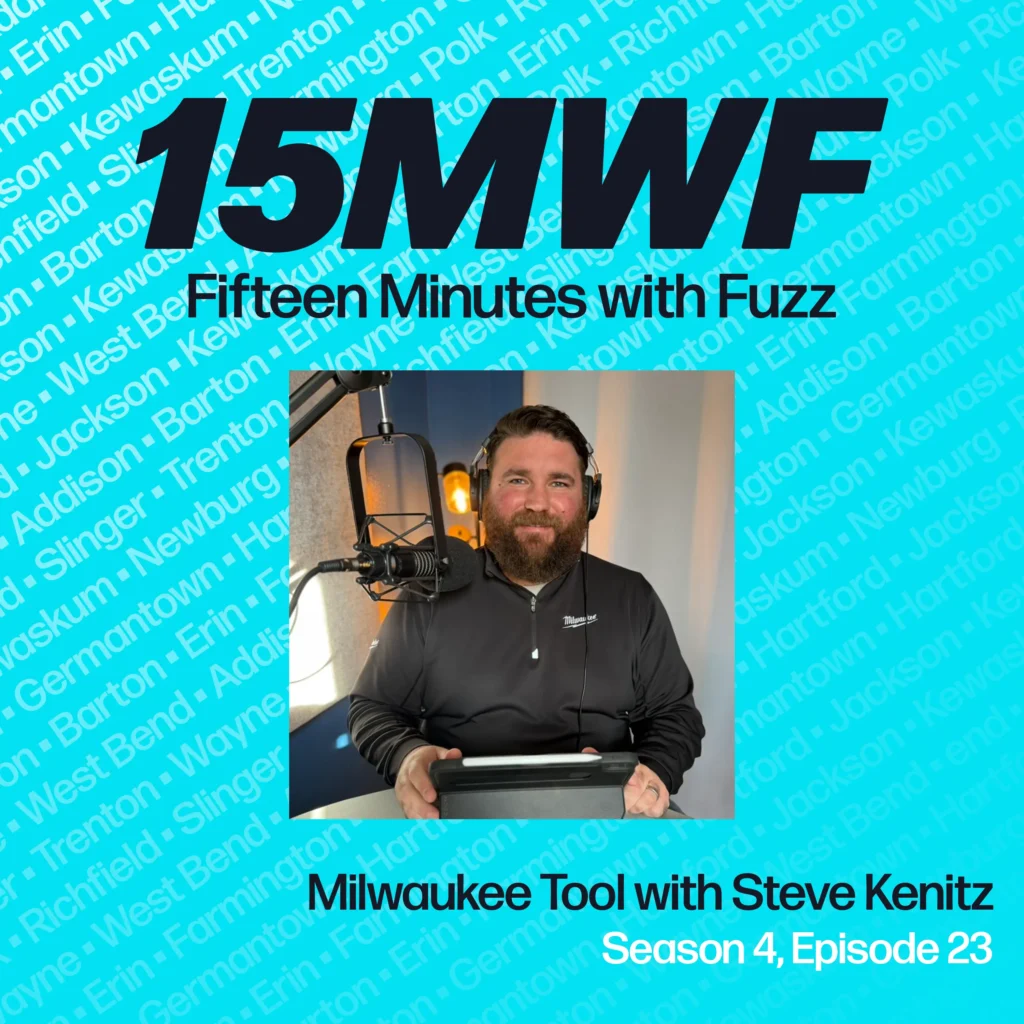[00:00:00] Fuzz Martin: Hello, Washington County. Thank you for tuning in to Fifteen Minutes with Fuzz. I am your host, Fuzz Martin, and this is a show about positive things happening in and around Washington County, Wisconsin. And you know what? Every four years, we could use a little extra positivity between neighbors, right?
Thanks. Right. Especially today. So, uh, thanks for pulling this show up on your podcast, player. I appreciate you, neighbor. This week, I am joined by Cassandra Erato, the CEO of Spaulding Clinical. Spaulding Clinical is a clinical research facility located right here in West Bend in the former St. Joe’s Hospital facility, and not enough people know exactly what they do there.
And It’s some pretty important work, so let’s all learn about it together. With that, here are 15 minutes on Spaulding Clinical. With Cassie Erato on Fifteen Minutes with Fuzz.
Cassie, thanks so much for joining me today on Fifteen Minutes with Fuzz. For those who are listening who might not be familiar with Spaulding Clinical, can you give us a high level overview of Spaulding Clinical? What your organization does and the role that clinical research plays in advancing medicine.
[00:01:34] Cassandra Erato: Yes, so every new drug product that needs to come to the market in the United States or globally needs to go through three phases of testing, Phase 1, 2, and 3, to determine if the drug is safe and effective and how it’s absorbed in the body. And we do phase one testing, so that’s all in, normal healthy volunteers, although we do a little bit in later phase, but, that’s basically in healthy volunteers to determine if the drug is safe and how it’s absorbed in the body before it moves on to the next phases of testing.
[00:02:09] Fuzz Martin: So then once it’s done there, if it, if it passes, it goes on to the phase two and then phase three, is that, and then eventually FDA approval or something like that. Is that how that works? Yes, exactly. Okay, very good. So what kinds of trials then are done at Spaulding Clinic? How does that, it’s all, all medicine kind of things?
[00:02:27] Cassandra Erato: Yes, we really see everything. So we’re working with primarily smaller biotechs. So we, our customers can be pharmaceutical companies or biotechs. Because we’re a smaller company, we work really well with small biotechs. But it’s every type of, therapeutic area. We work in infectious disease, in mental health, CNS, in, really everything.
The only thing we don’t really touch is oncology because you can’t give that in normal healthy volunteers. Oh, sure.
[00:02:56] Fuzz Martin: Okay. Because radiation and things like that a lot of times. Yeah. Okay. Very good. And, uh, I’m sure you have. You know, there’s NDAs and confidentiality and those kind of things, but are there any, organizations that you could mention that maybe people might be familiar with that may have passed through Spaulding Clinical here in, in Washington County?
[00:03:13] Cassandra Erato: Yes. So, I can talk about this one because it’s published in public papers, but, um, we work a lot with the Food and Drug Administration, with the FDA. So they’re not testing new drugs, obviously, but they ask us to test products to inform their policy. So we’ve tested sunscreen products for them to determine if it’s absorbed into the blood.
Opiates, a lot of different products.
[00:03:35] Fuzz Martin: Okay, very good. From a, a subject standpoint, so you, again, you’re looking for, you’re in phase one, you’re using healthy subjects. Can you walk us through a typical trial, start to finish, you know, How does someone get signed up to be a participant in the study?
You know, do they stay at your facility? How long are they there? Those kind of things.
[00:03:54] Cassandra Erato: Yes. So, they would call into our recruiting department to set up an appointment and the recruiter will go through their medical history and make sure that they’re healthy and can participate. Then they come in for a screening appointment and that’s about three hours.
where we do a physical exam, medical history, and just basically check that you meet all of the criteria for the study. Then you’ll receive a phone call within the next couple of weeks if you’re accepted. You check into the trial. Trials can be anywhere from two days to 20 days, and um, but a typical is about five days.
You check into the unit, you go through that whole screening process again to make sure you’re still healthy, still qualify, and We check all of the luggage coming in to make sure there’s no food or drug products coming in. And then you check into the study floor, which is a former hospital facility. So it feels like you’re staying in a hospital, but a lot of people also say it feels like summer camp.
So you’re there with maybe 20 other people, and then you go through each study day, stay there overnight, and then check out at the end.
[00:04:58] Fuzz Martin: And these studies, I assume, are all different types of people from young to old and, Yes. Different, you know, walks of life and those kind of things, right? Mm hmm. Because you, you have to test all kinds of different drugs and those kind of things, right?
[00:05:13] Cassandra Erato: Yes. It’s typically 18 to 55 years old. Okay. Although we’re recruiting 55 to 85 right now. And, It’s all ethnic backgrounds, and we also have, we have college students, we have people in their 40s who are doing it as additional income, we have a ton of Etsy businesses, college students, huge variety of people.
[00:05:33] Fuzz Martin: And do people come in from all around for this, or are they mostly here in southeastern Wisconsin?
[00:05:37] Cassandra Erato: If it’s a longer trial, we see people from all over the United States. If it’s a quick, short two days and they need to come back frequently, then it’s around the Milwaukee area.
[00:05:46] Fuzz Martin: Very good. After the trial is over, do the participants ever see the results of the study, or are they just, mostly Not typically.
Yeah,
[00:05:56] Cassandra Erato: don’t know. Sometimes if there’s a paper published, they’ll know.
[00:05:59] Fuzz Martin: Sure. Okay. Do you have any kind of clinical success stories that you can talk about, maybe share, over the years of how clinical research through Spaulding Clinical has helped advance medicine and healthcare? You know, the things that have happened here in West Bend, Wisconsin have helped kind of globally or nationally, the healthcare industry?
[00:06:21] Cassandra Erato: Yeah, I mean, there’s a lot of them, but I’ll talk about one from recently about three years ago. We did a trial for the FDA They are with the opiate epidemic in the United States They were looking at if you’re giving opiates with an antidepressant or with an antipsychotic Does that increase the chance of overdose or respiratory depression and we found that it did with Antidepressants, so if a random college student is on an antidepressant and somebody at a party hands them an opiate, they should know they’re at a greater risk of death.
So, and there was a, JAMA article published on that. So, incredible study.
[00:07:01] Fuzz Martin: Very good. So, Spaulding Clinical has been around since 2007. Your organization is very prominent in the community and known for giving back. What are some of the organizations and programs that Spaulding Clinical supports in our community?
[00:07:15] Cassandra Erato: We’re really centrally we work with the United Way and support United Way and for a long time, Randy Spaulding has been, ahead of a campaign year, but really throughout the year we’re holding constant fundraisers to support United Way because they have so many amazing programs that support the community.
[00:07:32] Fuzz Martin: Very good. You’ve been with Spaulding for a while. 17 years, is that right? Yes. So you started as a clinical research coordinator. I wrote these all down so you know. I didn’t memorize these. You were a nurse practitioner, director of clinical operations, the chief operating officer, and then in 2020 became CEO.
So you’ve been, you’ve seen every aspect of the business. What have been some of your most Rewarding experiences along that journey.
[00:07:59] Cassandra Erato: Absolutely central to that is the most difficult times. So all our most challenging times have made me grow so much individually as a person. Beyond that, we had a.
Since we were founded, we have a really large cardiac safety component where we’re passionate about long QT syndrome and the people that, you know, random high school student that dies on the basketball court because they didn’t know they had that. So we have a medical device that detects that, but recently we did a trial for a drug to treat that and it actually showed promise.
So that was extremely rewarding to see that come to fruition. And last, you know, in our earliest days when we were first starting the company, we were there, there was nine of us and we were there around the clock and I had babies. I had two infants at home and, we were able to set up a, a daycare facility in the building so that I could see them and be with them.
And that was an awesome part. It was before we had customers, but we were just, I would be there during the day. My husband would stay all night. So, that was a very rewarding part of the job.
[00:09:04] Fuzz Martin: So, now, as CEO, what are some of the values or guiding principles that drive the way that you and your team, work at Spaulding Clinical?
[00:09:13] Cassandra Erato: Well, we have four values that we were founded based on. They were heroic ambitions, ingenious solutions, self awareness, and loving care. But one that’s dear to me is self awareness, and it’s just about knowing yourself, knowing your strengths and weaknesses. And I try to, I strive for that every day, and I’m human, I make mistakes, but in all of the teams, it’s about putting aside your own ego and knowing, doing what’s the greater good for the company.
[00:09:40] Fuzz Martin: And then speaking of work, you have a wide range of careers at Spaulding Clinical. You need nurses, pharmacists, doctors, phlebotomists, paramedics, and on and on, people working in management and those kind of things. What’s your approach to creating a workplace that supports, professional growth, a sense of community, and, and, and like in your growth, I mean, you, you started, and, and grew your career over 17 years.
How do you, how do you support that?
[00:10:07] Cassandra Erato: So clinical research is extremely challenging, and a lot of people don’t know what it’s like. So we operate what’s like a small hospital and we’re recruiting people who are coming from local hospitals and healthcare facilities. But when they come into clinical research, it’s so different.
So we’re trying to coach people on what that’s like before we’re hiring them. But sometimes you just don’t know, drawing blood in a hospital is very different than having to collect it on the second for 20 people in a row and under a high pressure situation with a bunch of people watching over your shoulder, sometimes a pharmaceutical sponsor.
So but once people get through that first year and realize it is for them, it’s not for everybody. Once they get through that, there’s tremendous growth opportunity. And we have a lot of people there for a long time that really enjoy it. Also, we’re a family business, and we try to create that environment.
And, that’s what our employees have said for so long, that it feels like a family. It feels like that community.
[00:11:09] Fuzz Martin: You said you, you had started with, what was it, nine, nine employees? Mm hmm. And what are you at now? What’s
[00:11:14] Cassandra Erato: About 200.
[00:11:15] Fuzz Martin: About 200, wow, okay. And, um, how do you invest in training and kind of supporting that?
Well, I mean, even It’s, there’s a lot of talk about the need for healthcare professionals. How do you support that next generation of medical professionals here in Washington County?
[00:11:32] Cassandra Erato: Yeah, so we do a lot of work with the local high schools. With Slinger, West Bend, Kewaskum. We’ve had them tour through the facility.
I just talked to an AP psych class yesterday. It’s giving them that exposure to research because so many of us at Spaulding say, you know, when I was in nursing school, we didn’t hear anything about this. West So it’s giving them exposure to know that this world exists. And then, , the technical college, we have a pharmacy program with Concordia.
We’re always trying to expose to our world. And then once you’re in the door and the opportunity for career growth within this industry is tremendous because there’s only 70 sites like ours in the world. Once you get through. You know, that initial shock of the research environment, but then you start putting the work in.
You can go from being a tech at entry level to charge staff to then a study manager. And study manager life is really, really difficult, but if you put four or five years in on that, you now have a world opened up to you that is incredible for advancement. We’ve had so many people come through in the study manager position.
And are now working across the country and in clinical research.
[00:12:43] Fuzz Martin: Great. Looking into the future for Spaulding Clinical, what do you, what are some of your goals for the company?
[00:12:51] Cassandra Erato: Well, when Randy Spaulding founded the company, it was based on being technology advanced and using that to allow good drug, better drugs to come to market.
So when these small biotech companies have limited funds, How do we use that technology to help them get their results faster so they don’t run out of money before they get the drug to that point? And we have largely accomplished that, but we want to expand it. So we’re this small company in West Bend, Wisconsin.
We need to really spread the word in the industry of who we are, and that takes a lot of marketing dollars and sales effort. So we’re putting a lot into that. But second is to continue to expand that technology. We have. The world of AI coming in right now. And a lot of our industry doesn’t know how to deal with new tech because we’re slow and regulated, but we’re experienced with that.
So we’re really, investing a lot in that right now.
[00:13:47] Fuzz Martin: Sure. Wrapping up, if somebody wants to learn more about first working with Spaulding Clinical, what, what would be the best way for them to, to reach out or to find out more about them?
[00:13:59] Cassandra Erato: They would go to Spauldingclinical. com and there’s a jobs, careers page.
Submit your resume there, but I highly recommend putting in a email or a cover letter talking about why you’re interested in research.
[00:14:10] Fuzz Martin: Very good. And then if somebody wants to test the waters with perhaps becoming a, uh, a subject, I, I don’t know what to call them. Is that a subject? Is that participant?
Participant, there you go. What is the, the best method for them to go about them?
[00:14:23] Cassandra Erato: They would go to SpauldingPays. com.
[00:14:26] Fuzz Martin: Okay, SpauldingPays. com. All right, very good. Well, Cassie, thanks so much for coming in. And, it’s great to have you and learn more about Spaulding Clinical because I drive past it all the time and I know, I knew very little but now I feel like I, I know a lot more and I, I appreciate you, uh, Shedding some light for us.
Thank you.
[00:14:42] Cassandra Erato: Yes. Thank you so much for having me.
[00:14:46] Fuzz Martin: Thank you again to Cassandra Erato of Spaulding Clinical for joining me on this week’s episode of Fifteen Minutes with Fuzz. As always, if you ever have an idea for the show, it’s real easy to suggest it to me. The first way is to go to my Suggest a Guest form on my website.
Simply go to fuzzmartin. com slash guest, And fill in the form. It’s fuzzmartin. com slash guest, or you can just email me fuzz at fuzzmartin. com. That is fuzz at fuzzmartin. com. New episodes come out on Tuesdays. The show’s available wherever you’re listening right now, as well as on Apple podcasts, Spotify, YouTube, and at fuzzmartin.
com. Or, you know, a host of other podcast players too numerous to mention. Thanks again for listening and I will talk to you again next week right here on Fifteen Minutes with Fuzz.




